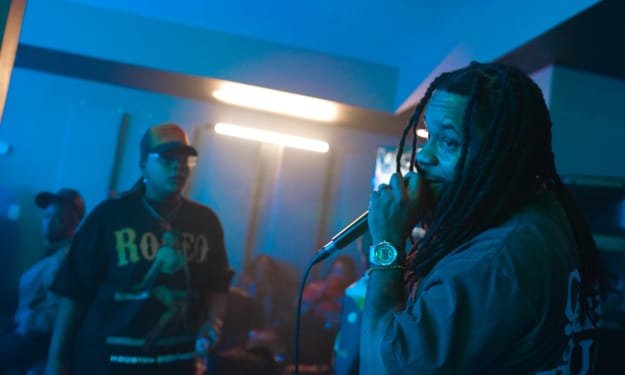All Rap is 'Conscious Rap'
Let's Retire the Redundant Phrase

"Conscious rap" is defined as rap music which "challenges the dominant cultural, political, philosophical, and economic consensus." Which, if you ask me, sounds a hell of a lot like regular, old rap. The definition continues to state that "conscious rap" songs usually contain "positive, uplifting messages, often delivered over smooth ear-grabbing beats." Which again, to me just sounds like rap.
I've always known Hip Hop to be an abrupt, abrasive stance against the status quo. So why is it that the music which takes that stance now has a prefix; is a sub-genre? As if to suggest that "rap" and "consciousness" don't go hand-in-hand, anyway.
To be conscious is to be awake (although we prefer "woke"), but more importantly, to be aware. Rap music, at its core, is all about awareness. So what gets dubbed as "conscious" in this genre literally centered on consciousness?
Let's talk about Kendrick Lamar. Mr. Conscious Rap. Good Kid, M.a.d.d. City and To Pimp a Butterfly were masterful, critically acclaimed. Social commentary and analyzations drove the narrative of both projects.
The problem is, when compared to the mainstream music released around the same time, Kendrick's sound was "boring;" "too serious." Kendrick made you think, and that was not appreciated by some just looking for good beats, seeking mindless entertainment, or something they can just dance to. (Understandable. Fair enough.) Type in Kendrick Lamar and conscious rap on Twitter, and you're bound to see someone expressing their hatred or boredom.
But it's not just Kendrick, obviously. "Conscious rap" in general has a bad, well...rap. The term has a negative connotation, especially among many young people who feel it's condescending or pretentious. Both artists and fans of "conscious rap" are often perceived to be music snobs or music elitists — and often times, they are. More often, though, they are an audience which seeks both good music and good lyrics. A beat isn't enough to earn their respect. And again, to me that sounds like a regular standard for regular rap.
Lyrics, at one point, were everything. The fact that the current musical trend has strayed away from that focus doesn't change rap at its core. Lyrical artists aren't unusually "conscious." The mumbling, half-singing, buzzword artists are the ones out of place. You know who I'm talking about. You most likely have their music on your phone, like I do. You listen to them at parties or in the car with your friends, like I do. You don't really know what they're saying. You don't really care. You doubt they live the lifestyle they rap about. You don't really care. You can't easily tell them apart from one another, but you can narrow it down to two or three dreadheads. It sounds good. It's fun. But recognize that it's a trend; a branch of Hip Hop, but not the standard.
So modern artists like Kendrick, Ab-Soul, Lupe, J. Cole, Mick Jenkins, Joey Bada$$, etc. aren't "conscious rappers." They're just rappers. Doing what rappers have always done — making both blatant and subtle observations on the world around them.
Another complaint, aligning with the "boring" argument, is that all "conscious rap" is about the same thing; Kendrick's always talking about blackness and "conscious" topics range from third eyes to Reaganomics. Some argue that to be conscious is to be totally intellectual, awkwardly proper, or unrelatably spiritual; that there's just not the grit or vulgarity that makes rap interesting.
For a quick second, I could see where this argument was coming from.
But then, what about Biggie? He is the epitome of provocative. Drugs. Sex. Crime. Violence. As vulgar as they come. But would you argue that he wasn't conscious? Unaware? Did he not make social commentary, bold statements? Biggie is one of the greats, and inarguably insightful, despite his vulgarity. You'd be out of your mind to say he wasn't "conscious." The key difference between Biggie and a lot of mainstream artists today is that he could be both provocative and lyrical, which ultimately worked to highlight his awareness (not diminish it) and showcase how in tune he was with the world around him.
You can't say that Biggie wasn't doing what Kendrick is doing: publicly discussing the more unpleasant topics, issues, and influences, which are generally obscured by the media and the elite. Their platform was used to speak to social turmoil, in one way or another.
So there goes that argument.
Every great rapper you can think of was conscious. At some point, you're going to have to separate your perception of "consciousness" with actual consciousness, and realize that it's always been at the center of rap, no matter how gritty or intellectual.
Consciousness in rap music is the norm and always has been. Consciousness is what's made rap relatable, captivating, and most importantly, pure. Of course a rapper is conscious. That goes without saying. Or, at least should.
The fact of the matter is, and don't kill me, Uzi is the outlier and his work is the sub-genre. It's trendy, it's fun, and it's pushing the Hip Hop culture onto what's next. But Uzi, Chief Keef, and Lil Yachty are not going down as greats. And that has as much to do with their lack of talent or originality (again, don't kill me) as it has to do with their lack of consciousness.
Instead of unnecessarily sub-categorizing the common elements of awareness and social commentary as "conscious," it would be more appropriate (and efficient and logical) to categorize someone like Chief Keef as an "unconscious" rapper. And much less redundant.
About the Creator
Jaylin Paschal
Hip Hop Enthusiast + Creative Strategist + Content Creator.







Comments
There are no comments for this story
Be the first to respond and start the conversation.